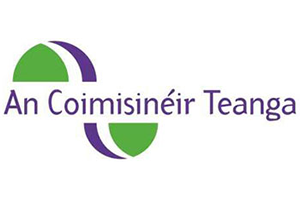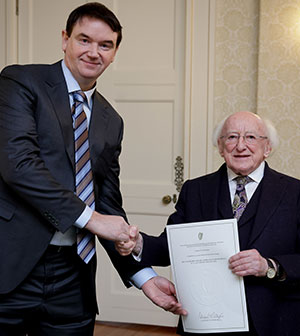Office of Irish Language Commissioner (Ireland)
About the Member
Séamas Ó Concheanainn was appointed Coimisinéir Teanga by President of Ireland, Michael D. Higgins at a ceremony at Áras an Uachtaráin on the 6th December 2023. Séamas assumes the position of Coimisinéir immediately having been Director of Oifig an Choimisinéara Teanga since 2020. He succeeds Rónán Ó Domhnaill, who took the role of Media Development Commissioner with the newly formed Coimisiún na Meán in February 2023.
On his appointment, Mr Ó Concheanainn said:
“I look forward to the opportunity to make a significant contribution as Coimisinéir Teanga to improving the public services provided by public bodies through Irish to the Irish speaking community. It is a welcome development that the amended language legislation (Official Languages (Amendment) Act, 2021) is currently coming into effect to strengthen the language rights of the Irish-speaking community. The new language legislation includes significant commitments such a National Plan setting out the public sector's (comprising more than 500 public bodies) approach, to ensuring that the language rights of the Irish-speaking community are met. It will be critical to have sufficient human resources with proficiency in Irish to deliver the new public services. A national effort will be required, including a central role for the Irish-medium higher-education sector in providing the qualified staff that public bodies will require for the realisation of the language rights prescribed in the amended legislation.”
Speaking to the provisions that have already been commenced, the newly appointed Coimisinéir said:
“I greatly welcome the evident increase in Irish language advertising across all media platforms. Section 10A (Advertising by Public Bodies) places statutory responsibilities on Public Bodies to place a significant portion of their advertising through Irish. It is important that the Irish language is central as a discursive medium in the public sphere.”
A native of An Spidéal in County Galway Séamas Ó Concheanainn has spent three years working as Director of Oifig an Choimisinéara Teanga. Prior to that, he held the position of Director of Acadamh na hOllscolaíochta Gaeilge's Gaeltacht Centre in Carna, Co. Galway, where he had both academic and management responsibilities. Séamas has also been involved in various Irish language-based research topics, including Fios Físe, a national research project that aimed to measure the popularity of Irelands Irish language public service broadcaster, TG4 among the Irish-speaking community. He has a particular interest in language planning and community development and has volunteered with a wide range of organisations and community committees over the years.
Séamas is the third appointment to the office of An Coimisinéir Teanga and this is the first time the position of An Coimisinéir Teanga has been filled following a public recruitment campaign.
The appointment of An Coimisinéir Teanga is for a term of 6 years.
About the Member’s Office
The Office of An Coimisinéir Teanga was established in 2004, under The Official Languages Act 2003, to monitor the compliance of public bodies with the provisions of that Act. The original 2003 Act was significantly enhanced with the commencement of provisions in the 2021 Amendment Act. The main objective of the Acts is to ensure better availability and a higher standard of public services through the Irish language. The Office enquires into complaints from the public and initiates investigations where it is alleged that public bodies may have failed to comply with the Official Languages Act or other enactments relating to the status or use of Irish. It is the duty of An Coimisinéir Teanga to ensure that the language rights of the Irish language community are implemented in accordance with the Official Languages Acts (2003 & 2021).
A written report on every investigation with findings and recommendations is sent to the Minister for Arts, Heritage, Regional, Rural and Gaeltacht Affairs, to the public body and to the complainant, as appropriate. Any person affected by the findings and recommendations of the investigation may appeal to the High Court on a point of law within four weeks.
The Office of An Coimisinéir Teanga monitors how public bodies fulfil their duties under the Official Languages Act and how they comply with the provisions of their statutory language schemes under the Act. The Office also provides advice to the public regarding language rights and to public bodies regarding language duties under the Act.
Further details can be found on: www.coimisineir.ie
Key Information on the Language Situation in this Country/Region
Ireland has two official languages ‒ Irish and English. The Irish Constitution provides that the Irish language, as the national language, is the first official language of the country. The English language is recognised as a second official language. In practice, however, it often happened that no effective provision was made to provide services in Irish as well as providing services in English. People who wished to conduct their business in Irish with the State often felt that they had no option except to use English in order to conduct their business properly. The aim of the Official Languages Act 2003 was to improve the quantity and quality of services through Irish from public bodies.
Irish, the indigenous language of Ireland, was spoken by the majority of the population down to the middle of the 19th century. Currently, it is spoken as a community language in “Gaeltacht” areas, mainly along the west coast of Ireland. In 2007, a linguistic study revealed that Irish was the principal community and home language in 24 of the 154 electoral divisions in the Gaeltacht.
Outside the Gaeltacht, Irish is spoken as a minority language throughout Ireland. According to the 2022 Census, 1.87 million people over the age of three defined themselves as Irish speakers (an increase of 6.4% of the population from 2016 Census figures of 1.76 million people). The figures for daily speakers however, paints a somewhat different picture - where 71,968 people stated they speak Irish on a daily basis, outside of the Education system (a decline of 2.5% from 2016 figures).
Language rights endure when they are respected. With the revised Act, the inclusion of new language rights presents a significant opportunity for over 500 prescribed public bodies to enhance the quality and accessibility of Irish language services provided to the Irish-speaking community. To encourage proactive efforts from public bodies and raise awareness about the statutory duties and new language rights, the Office progresses a national awareness program for both public bodies and the general public.
The Annual Reports of the Office of An Coimisinéir Teanga which provide a detailed account of the work of the Office since its establishment in 2004 are available on its website at www.coimisineir.ie/Foilseachain



